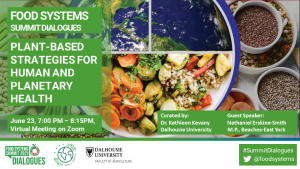Type of Dialogue
Convened by
Language of Dialogue Event
Date/time
To:
Geographical focus
Format
Please review the details below for registration information if available or contact the Convenor if you would like to attend.
Description
Register here: https://us02web.zoom.us/meeting/register/tZAqfumspzgoE9QpehskKfr6oA3di2zcIAk4
Food Systems Summit Dialogues offer a purposeful and organized forum for stakeholders to come together to share their roles in food systems, consider their impacts on others and find new ways to come together in support of the Sustainable Development Goals. Join us Wednesday, June 23 from 7:00PM – 8:15PM EDT where we will be discussing the importance of plant-based strategies for human and planetary health with Dr. Kathleen Kevany and guest speaker Nathaniel Erskine-Smith, M.P., Beaches-East York.
By working in partnership with farmers, associations, and researchers, efforts can be focused on avoiding further climate change, protecting soils, land, habitat, and biodiversity, while improving water with economic benefits to farmers. Among other ideas, inclusion of pulses in rotation is an important strategy[1]. Other proven approaches, including emphasizing plant-based, should be scaled up to feed a growing world population with healthier food, while reducing global warming and re-stabilizing weather patterns, and increasing environmental sustainability[2].
Drawdown has modeled and measured 100 strategies worldwide, including 25 ways to improve food production and reduce emissions. The most effective ways to reverse global warming while also increasing economic benefits, are to reduce food waste and to increase plant rich diets[3]. Clark et al. (2020) show that even if fossil fuel emissions were eliminated immediately, emissions from the global food system alone would make it impossible to limit warming to 1.5°C and difficult even to realize the 2°C target. Thus, major changes are needed in how food is produced if we want to meet the goals of the Paris Agreement. An essential step is accelerating adoption of more plant-based foods [4].
1. AAFC. (2021). Agricultural Climate Solutions. https://www.agr.gc.ca/eng/agriculture-and-the-environment/agricultural-climate-solutions/?id=1615985409730
2. Willett, W., et al. (2019). Food in the Anthropocene: the EAT–Lancet Commission on healthy diets from sustainable food systems. The Lancet, 393(10170), 447-492.
3. Hawken, P. (Ed.) (2017). Drawdown: The Most Comprehensive Plan Ever Proposed to Reverse Global Warming. New York, NY: Penguin Books
4. Clark, M. A., Domingo, N. G., Colgan, K., Thakrar, S. K., Tilman, D., Lynch, J., … & Hill, J. D. (2020). Global food system emissions could preclude achieving the 1.5° and 2° C climate change targets. Science, 370(6517), 705-708


